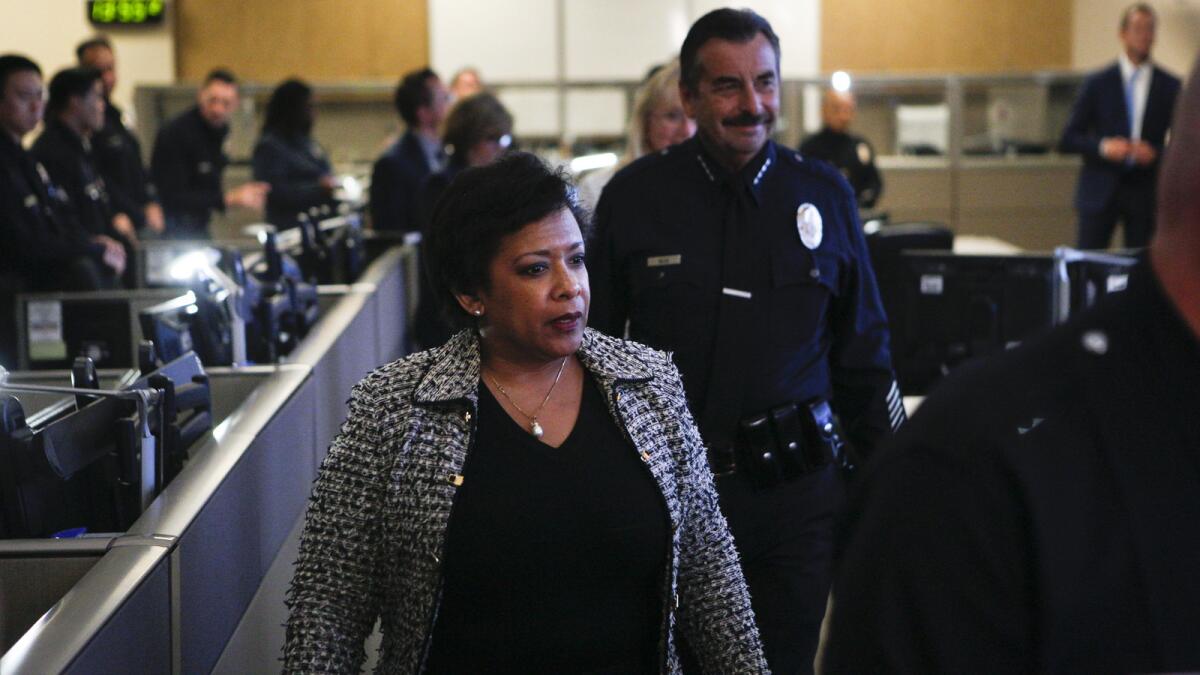Justice Department formally closes Clinton email investigation with no charges

- Share via
Reporting from Washington — The Justice Department on Wednesday formally closed its investigation into Hillary Clinton’s use of a private email server, following the rare public recommendation of FBI Director James B. Comey, who said a day earlier that the former secretary of State’s actions, though sloppy, did not warrant criminal charges.
The decision was announced in a statement by Atty. Gen Loretta Lynch, who said she had met late Wednesday with Comey and career prosecutors and agents who conducted the investigation.
“I received and accepted their unanimous recommendation that the thorough, year-long investigation be closed and that no charges be brought against any individuals within the scope of the investigation,” Lynch said.
The outcome was expected since Lynch had previously declared her intention to remove herself from the final decision. Many legal experts have long predicted that the Justice Department would not be able to meet the standard for criminal charges as it investigated whether Clinton and her aides mishandled classified material while communicating on a private email server outside of normal government channels.
Both Comey and Lynch now find themselves enmeshed in a political controversy over the matter. Republicans have spent two days bashing the FBI director for not recommending that Clinton face criminal charges despite telling reporters that the presumptive Democratic presidential candidate and her aides were “extremely careless” in how they used the private email system during her time as the nation’s top diplomat.
Lynch has been criticized for meeting privately with Clinton’s husband, former President Bill Clinton, on her government jet last week at Phoenix’s international airport. The attorney general has said she only discussed personal matters and the investigation of his wife did not come up. Even so, it forced her to announce she would accept the recommendations of Comey and career prosecutors and agents who worked the case.
Comey is expected to testify Thursday before the House Oversight and Government Reform Committee, and Lynch is scheduled to appear next week before another House committee. Both are expected to face sharp questions from Republicans about their decision.
Cleared but no clean bill of health: Email issue to linger for Hillary Clinton until election day »
GOP lawmakers are pushing Comey to release more details about the probe, including a copy of Clinton’s interview with law enforcement agents.
Elected leaders including Rep. Paul D. Ryan (R-Wis.), the Speaker of the House, to Sen. Charles E. Grassley (R-Iowa), chairman of the Senate Judiciary Committee, have been critical of the FBI recommendation. Grassley on Wednesday fired off a letter to Comey demanding information about how he reached his recommendation in light of “inconsistencies” in his reasoning “that raise serious questions as to how the FBI reached its conclusions.”
On Tuesday night, Donald Trump complained that the Justice Department review was “rigged” and suggested, without providing evidence, that Hillary Clinton had tried to bribe Lynch by offering to keep her as attorney general if Clinton wins.
Comey’s recommendation removed the threat of criminal charges, but the FBI director did not mince his words about what he considered to be careless and sloppy communications practices.
FBI agents found that 110 emails in 52 email chains contained information that was classified when it had been sent, Comey said. Eight of those chains contained information that was top secret, the highest level of classification. An additional 2,000 emails, Comey said, were upgraded to classified status at a later date.
Comey also said that it was possible that a foreign power managed to hack into Clinton’s personal account and complained that Clinton had used the unsecured service while traveling in trips “in the territory of sophisticated adversaries.”
“There is evidence that they were extremely careless in their handling of very sensitive, highly classified information,” Comey told reporters at FBI headquarters on Tuesday.
Even so, he said, “our judgment is that no reasonable prosecutor would bring such a case.”
In reaching that conclusion, Comey said he and other top bureau officials had determined that the case lacked the aggravating factors that have led to charges in other cases. Those previously charged in such instances intentionally or willfully mishandled classified information, or did so in such vast quantities that they must have known what they were doing. Others had been disloyal to the United States, he said, or tried to obstruct justice.
“We do not see those things here,” he said.
ALSO
Atty. Gen. Loretta Lynch defends meeting with Bill Clinton amid email probe
Trump and Clinton are giving people lots of reasons to vote against them
Donald Trump blames a ‘rigged system’ for FBI’s recommendation not to charge Hillary Clinton
UPDATES:
3:56 p.m.: This story was updated with additional background.
This story was originally published at 3:11 p.m.
More to Read
Sign up for Essential California
The most important California stories and recommendations in your inbox every morning.
You may occasionally receive promotional content from the Los Angeles Times.














